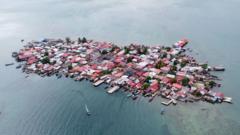The Guna people of Gardi Sugdub, Panama, have begun a painful transition due to climate change, abandoning their low-lying island home for prefabricated housing on the mainland. With rising sea levels posing an imminent threat, many residents left behind cherished memories and community ties. The new settlement, Isberyala, presents opportunities for growth but also challenges in maintaining cultural identity and ensuring adequate resources.
Gardi Sugdub's Brave Transition: An Indigenous Community Faces Climate Change

Gardi Sugdub's Brave Transition: An Indigenous Community Faces Climate Change
As rising sea levels threaten their island home, the Guna community of Gardi Sugdub relocates to the mainland, grappling with loss and adaptation.
Delfino Davies, an island resident and museum curator, reflects on the dramatic changes affecting his community as the Guna of Gardi Sugdub in Panama face imminent relocation due to climate change. With scientists warning that rising sea levels could make their home uninhabitable by 2050, the first move involves a mass exodus from the island.
"We left pieces of our life behind," shares Magdalena Martínez, who along with many others, vacated Gardi Sugdub in June 2023 for newly built houses on the mainland. The change comes as residents confront both environmental threats and overcrowding concerns, as the island is merely 400m long and 150m wide. While some of the 1,100 residents transitioned to Isberyala, about 100 opted to remain behind for various reasons, including a reluctance to part with their ancestral land.
The new settlement was constructed with funds from the Panamanian government and the Inter-American Development Bank, offering better living conditions than those on the island, where flooding had become a distressing norm. Residents have expressed mixed emotions; while some say the new environment is a relief, others lament the loss of their traditional coastal lifestyle. “You miss your friends, the streets where you lived, being so close to the sea,” lamented Magdalena.
Cultural preservation amid adaptation has become a significant concern. Leaders like Tito López assure the community that while their surroundings may change, their identity and traditions will endure, especially as local schools introduce Guna music and dance to the younger generation.
However, challenges remain. The lack of healthcare services and unstable electricity has left some residents yearning for the comforts they left behind. Moreover, many people face an ongoing emotional struggle as they adapt to their new surroundings, with children often expressing nostalgia for their old community.
As the Guna navigate these profound changes, they stand as a poignant example of the far-reaching effects of climate change on indigenous cultures globally. The struggles and successes of Gardi Sugdub may serve as a template for other communities facing similar existential threats.






















